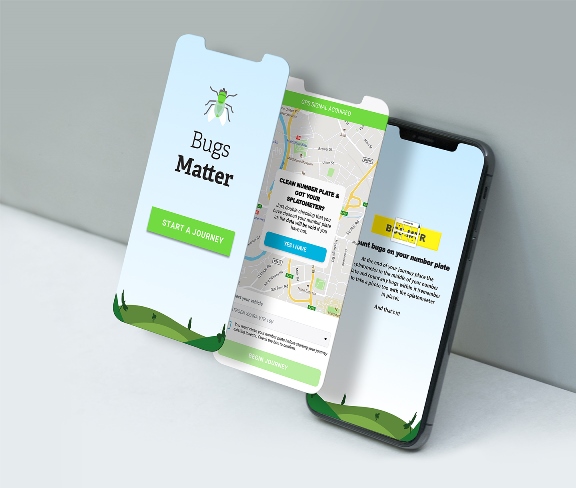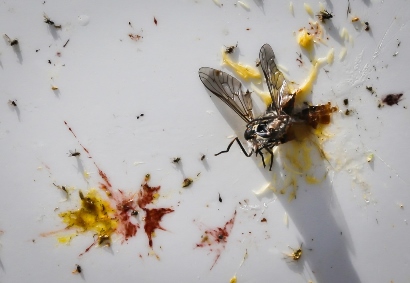Bugs Matter - the National citizen science survey of flying insect abundance
This post is greater than 6 months old - links may be broken or out of date. Proceed with caution!

By Dr. Lawrence Ball, Ecological Data Analyst Lead
%20%C2%A9%20Dan%20TP.JPG)
There are worrying signs that insect numbers have decreased around the world. In south west China, the number of pollinators has dropped so low, due to habitat loss and pesticide use, that farmers have to hand-pollinate apple and pear orchards. Several long-term studies have highlighted worrying trends in insect abundance, such as declines of 16% per decade in Britain’s moths and butterflies and 28% per decade in flying insects in Germany. The richness and diversity of insect communities has also plunged, with certain species of wild bees and other pollinators undergoing major declines, and several going extinct in the UK. Habitat loss, intensification of agriculture and pesticide use, pollution, climate change, and the spreading of parasites and pathogens around the world, can be pinpointed as the likely causes of these declines - all products of unsustainable human activities, and most projected to intensify in coming decades.
Simultaneously, our demand for pollination services in our food production systems has increased three-fold. In nature, many plant communities depend on insects for pollination, they decompose dead matter and waste helping to lock away carbon in soils, and they underpin food webs, serving as prey for many animal species. As a whole, invertebrates are critical to ecosystem functions and services, and without them, life on earth would collapse.
Given the potential enormity of the impacts of insect declines, on the natural world and the survivability of humans on Earth, developing a standardized mechanism through which we can accurately monitor insect numbers across the globe is of paramount importance. It is crucial that we not only quantify the rate of decline indicated by existing evidence for other insect groups in other areas, but that following interventions to halt and reverse these insect declines, we can track our progress towards restoring their populations.
In 2021, Kent Wildlife Trust, in partnership with Buglife and the RSPB, launched Bugs Matter - the National citizen science survey of ‘bug splats’ on vehicle number plates to monitor flying insect abundance. The method is analogous to the ‘windscreen phenomenon’, a term given to the anecdotal observation that people tend to find fewer insect splats on the windscreens of their cars now, compared to in the past. The survey runs every summer and involves citizen scientists across the UK using the Bugs Matter app to record the number of insect splats on their vehicle number plates following a journey, having first removed any residual insects from previous journeys.

Thousands of citizen scientists have signed up and recorded journeys, but we haven’t seen participation rates increase as much as we’d hoped given the value of the data! To make participation easier and increase the sensitivity of the sampling method, for the 2023 survey, we have removed the need to use a cardboard template to count insects. Instead, all insects on the number plate will be recorded and a virtual template will be added in the camera view of the app. We are also exploring AI as an automated solution to counting bug splats, but this won’t be added to the app for a while. Currently the survey only takes place in the UK but in the future, we hope to make the app and survey methods available in other countries.

After each survey season the data is cleaned and then analysed using statistical models. A range of variables are included in the models to account for their effects on insect splat rates, to obtain more accurate estimates of change over time. These include the time of day, length, and average speed of the journey, the vehicle type, the local temperature, the vegetation greenness surrounding the journey route, and the proportions of the journey conducted on different road types. The analysis is also conducted for different regions of the UK and even at county-level.
The results of Bugs Matter so far, show a 63.7% decrease in the number of insect splats in the UK between 2004 and 2022 (35.4% per decade), 5.3% greater than in 2021 (58.4%). These results are consistent with the declining trends in insect populations widely reported by others, however, these results are based on data with low temporal resolution and consequently we interpret this change between two points in time with caution. Inter-annual variation in a range of unmeasured factors that could influence flying insect activity or abundance, such as the record-breaking summer temperatures in 2022, could significantly influence the observed pattern. To draw robust conclusions about longterm trends in insect populations in the UK, scientists require data from multiple years, over long time periods, and over large spatial scales – the Bugs Matter citizen science survey has demonstrated that it has the potential to generate such data.
Do your bit for insect conservation and download the Bugs Matter app to take part in the 2023 survey which runs June-August! Every journey counts!
If you want to get involved make your way over to https://www.kentwildlifetrust.org.uk/get-involved/our-projects/bugs-matter
More from Kent Wildlife Trust